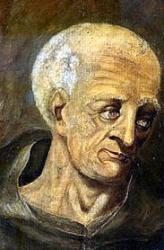- |
User Links
Al Pie de la Cruz Santa/Al the Cross Her Station Keeping
Junto al pie de la Cruz santa (At the cross her station keeping)
Author: Jacopone, da Todi; Translator (Spanish): Ramón Llubrí; Translator (English): Edward Caswall (alt.)Tune: STABAT MATER (Mainz)
Published in 3 hymnals
Representative Text
1 Junto al pie de la Cruz santa
Que del Hijo el cuerpo aguanta,
Con dolor su Madre está.
2 ¿Qué pesar se igualaría
A la pena de María
Al mirarle agonizar?
3 En supremo sacrificio
Participa del suplicio
Y la angustia de Jesús.
4 A su vista lo azotaron
Y con saña se mofaron
Del que diose por amor.
5 Velo ahora cómo expira
Y le escucha cual suspira:
"¡Padre, todo se cumplió!"
6 Por tu corazón que llora,
En el nuestro haz tú, Señora,
El amor a Dios crecer.
7 Y el dolor por el pecado
Que en la Cruz habrá clavado
A quien inocente fue.
8 Las angustias que sufría
Cristo en cruz, ¿quién osaría
Con su madre compartir?
9 Cuando llegue nuestra hora,
Sé tú nuestra valedora
Y el Señor tendrá piedad.
10 Y en el día del juicio
Séanos tu amor propicio
Y no habremos de temer.
11 ¡Oh, Jesús, consuelo y guía,
Ilumina, con María,
Nuestra senda terrenal!
Amén.
---
1 At the cross her station keeping,
Stood the mournful Mother weeping,
Close to Jesus to the last.
2 Let me share with you his pain,
Who for all my sins was slain,
Who for me in torment died.
Amen.
Source: Flor Y Canto (2nd ed.) #392
Author: Jacopone, da Todi
 Jacobus de Benedictis, commonly known as Jacopone, was born at Todi in Umbria, early in the 13th century, his proper name being Jacopone di Benedetti. He was descended from a noble family, and for some time led a secular life. Some remarkable circumstances which attended the violent death of his wife, led him to withdraw himself from the world, and to enter the Order of St. Francis, in which he remained as a lay brother till his death, at an advanced age, in 1306. His zeal led him to attack the religious abuses of the day. This brought him into conflict with Pope Boniface VIII., the result being imprisonment for long periods. His poetical pieces were written, some in Italian, and some in Latin, the most famous of the latter being "Cur mundu… Go to person page >
Jacobus de Benedictis, commonly known as Jacopone, was born at Todi in Umbria, early in the 13th century, his proper name being Jacopone di Benedetti. He was descended from a noble family, and for some time led a secular life. Some remarkable circumstances which attended the violent death of his wife, led him to withdraw himself from the world, and to enter the Order of St. Francis, in which he remained as a lay brother till his death, at an advanced age, in 1306. His zeal led him to attack the religious abuses of the day. This brought him into conflict with Pope Boniface VIII., the result being imprisonment for long periods. His poetical pieces were written, some in Italian, and some in Latin, the most famous of the latter being "Cur mundu… Go to person page >Translator (Spanish): Ramón Llubrí
(no biographical information available about Ramón Llubrí.) Go to person page >Translator (English): Edward Caswall
 Edward Caswall was born in 1814, at Yately, in Hampshire, where his father was a clergyman. In 1832, he went to Brasenose College, Oxford, and in 1836, took a second-class in classics. His humorous work, "The Art of Pluck," was published in 1835; it is still selling at Oxford, having passed through many editions. In 1838, he was ordained Deacon, and in 1839, Priest. He became perpetural Curate of Stratford-sub-Castle in 1840. In 1841, he resigned his incumbency and visited Ireland. In 1847, he joined the Church of Rome. In 1850, he was admitted into the Congregation of the Oratory at Birmingham, where he has since remained. He has published several works in prose and poetry.
--Annotations of the Hymnal, Charles Hutchins, M.A. 1872… Go to person page >
Edward Caswall was born in 1814, at Yately, in Hampshire, where his father was a clergyman. In 1832, he went to Brasenose College, Oxford, and in 1836, took a second-class in classics. His humorous work, "The Art of Pluck," was published in 1835; it is still selling at Oxford, having passed through many editions. In 1838, he was ordained Deacon, and in 1839, Priest. He became perpetural Curate of Stratford-sub-Castle in 1840. In 1841, he resigned his incumbency and visited Ireland. In 1847, he joined the Church of Rome. In 1850, he was admitted into the Congregation of the Oratory at Birmingham, where he has since remained. He has published several works in prose and poetry.
--Annotations of the Hymnal, Charles Hutchins, M.A. 1872… Go to person page >Text Information
| First Line: | Junto al pie de la Cruz santa (At the cross her station keeping) |
| Title: | Al Pie de la Cruz Santa/Al the Cross Her Station Keeping |
| Author: | Jacopone, da Todi |
| Translator (Spanish): | Ramón Llubrí |
| Translator (English): | Edward Caswall (alt.) |
| Meter: | 8.8.7 |
| Source: | Stabat Mater dolorosa |
| Place of Origin: | Germany |
| Language: | English; Spanish |
| Notes: | País: Alemania |
| Copyright: | Public Domain |


 My Starred Hymns
My Starred Hymns





